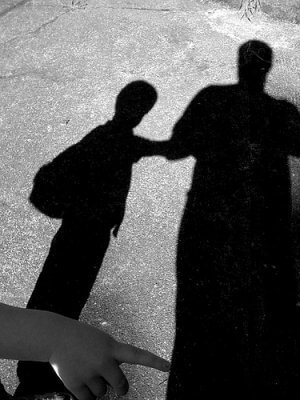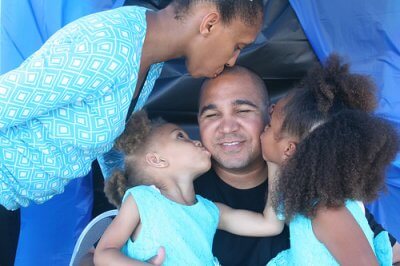Male Postpartum Depression – When Being a Dad Has You Down
‘Male postpartum depression’ might sound a strange thing that happens to other people.
But if you are finding fatherhood is leaving you moody, on edge, and not yourself? It’s time to pay attention.
When being a Dad affects your mental health
Trying to hide your struggles over being a Dad? It can help to know that you are far from alone if parenthood is leaving you low.
UK coaching consultancy Talking Talent published research showing that 72% of working dads admitted to being physically and emotionally worn out. The unhappy knock-on effect was that 57% of those exhausted fathers didn’t think they were being good enough parents or partners, either.
This sense of inadequacy – underperforming at work, but not being present enough at home – is manifesting as guilt, stress anxiety, and yes, depression.
[So down you don’t know what to do? Want to talk to someone who understands? Book an online therapist now and get talking.]
Male prenatal depression?
Father-related depression can also start in the lead up to having children.
A large-scale overview of depression in fathers looking at 29 years worth of American parenting studies found that–
–the number of men showing signs of depression starts to rise during the third trimester of pregnancy. Between three and six months after the birth of a baby, over a quarter of dads are displaying depressive symptoms.
Symptoms of depression in new dads
Like postnatal depression in mums, depression in new dads often goes undiagnosed. Along with general symptoms of depression (see our ‘Guide to Depression‘ for these), symptoms of depression can be different in men.
Postnatal depression in men can include:
- frustration and anger
- fear, confusion and a sense of helplessness
- using alcohol or drugs
- withdrawing from family life and social life
- physical symptoms, like headaches, insomnia or digestive problems.
But why would I have ‘Dad depression’?
There are many factors that can leave us more vulnerable to male postnatal depression than others. It can be a genetic pre-disposition. Or you might have unresolved past issues or childhood traumas you didn’t get help with, and a parent triggers them.
According to UK parenting charity NCT, you are also statistically more likely to suffer male postpartum depression if you are:
- under 25
- if the mother also suffers from depression
- or if you face financial pressures.

By: andrechinn
There’s also a lot to be said for the rising expectations on fathers these days. The rules of parenting are changing, and some men feel caught in the upswing.
Are new ways of being a dad at fault?
A study of over 2,000 fathers at Brigham Young University in America found that there is a definite shift in the ways that fathers are seeing their responsibilities. This includes:
- seeing fatherhood as equal to motherhood
- being more loving towards children
- spending more time with children.
New expectations, old pressures?
The upshot is that many men feel caught between a real desire to be a better dad, and the familiar pressure to be the breadwinner in a working culture that still rewards long hours and single-minded focus.
Yes, shared parental leave (SPL) in the UK allows parents to share up to 50 weeks of maternity leave, and 37 weeks of statutory pay after their baby arrives.
But take up of the scheme has been pitifully low with the government admitting it’s about 2% of eligible couples.
Many men worry that they will be seen as less committed to their careers – and less worthy of advancement – if they take too much time off for childcare.
Is my ‘dad depression’ really a big deal?
A study at Michigan State University found that the mental health of both parents can have a significant impact on a child’s development. Depression in fathers was found to lead to less co-operation in children once they were at school.
And a Canadian study on fathering found that good fathering when children are young means better intellectual ability and less behavioural problems as your child grows up.
How to handle male postpartum depression
So what can you do if you have ‘the Dad blues’?
1. Get the basics right.
Diet, exercise, sleep. It’s sometimes easier said than done, but looking after the small stuff can help you feel in control. Don’t use alcohol to blot things out – it will only make things worse.
2. Take time for yourself.
This can be tricky, especially in the first year of family life, but it is important. Meet a friend for coffee. Go for a walk. Of course arrange your week so mum gets time for herself, too.
3. Take time for each other.
As new parents you’ll often be exhausted, but just half an hour in the evening talking about your respective days can be therapeutic. Talk about how you’re both coping – just don’t let it descend into a competition to prove who is the most tired or stressed.
4. Connect. Talk to other dads.
That might be a local dads’ group, or just a dad at work. You’ll quickly realise that the tribulations of being a dad are widely shared.
5. Work it out.
At work, that is. Many more employers are sympathetic to a dad’s desire for a better work/life balance than used to be the case. Talk to your manager or the HR department. Is there an opportunity to work more flexibly, or even work remotely from time to time?
6. Accept your mistakes.
All children are different, and none of them come with a handbook. All dads make mistakes, so cut yourself some slack. Parenting is the very definition of learning on the job.
7. Give yourself credit.
You’re tired and stressed and struggling to find a perfect balance between work and home life. But guess what, your child is happy and healthy and loves spending time with you. There is no ‘perfect’ when it comes to parenting, so give yourself some credit.
8. Stay off social media.
Most people realise that social media is not a place to look for well rounded representations of real life, but it has a particularly insidious influence when it comes to fatherhood. The shiny, happy people of Instagram only make men more wary of showing what might be perceived as weakness. If it makes you feel bad, then stay away.
9. Get help if you need it.
It’s not ‘weak’ to seek support. If anything, it takes tremendous courage to do so. If you feel nervous about it, think about what you’d say to your kids if they were upset. Would you want them to talk to someone, and ask for help? Then why aren’t you?
Time to reach out and get help to be the great dad you really are? Harley Therapy connects you to top London therapists in central locations. Not in London or even the UK? Our booking platform offers UK-wide therapists, and online therapists you can talk to from anywhere.
Still have a question about male postpartum depression? Post in our public comment box below.
Written by: Hugh Wilson. Hugh Wilson is a freelance journalist based in West Yorkshire. He writes about parenting, health, technology, business, and workplace issues.






